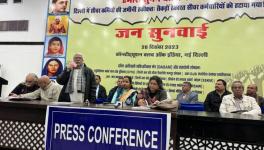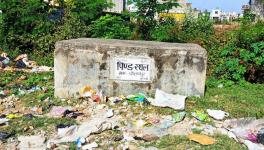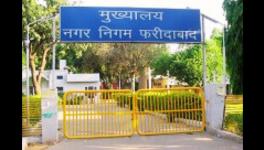Lack of Provisions in Urban Policies and Stringent Laws Lead to Sewer Deaths: PUDR Report
On October 2, 2019, while the nation celebrated the 150th birth Anniversary of Mahatma Gandhi and Prime Minister Narendra Modi declared rural India as open defecation free (ODF), a civil rights group released a report revealing the sorry state of sanitation workers in the national capital, Delhi.
The report titled “Chronic ‘Accidents’: Deaths of Sewer/Septic Tank Workers, Delhi, 2017-2019” by People’s Union for Democratic Rights (PUDR) said that a complete absence of planning for maintenance of sewers, septic tanks and waste disposal systems can be seen in the urban policies made for Delhi by the state, municipal bodies, institutions and private companies.
The findings of an investigation conducted into six incidents of deaths of sanitation workers in Delhi while cleaning sewers/septic tanks over the last two years narrate the significant repetitive patterns which cause the death of sanitation workers. Lack of planning and provision for and maintenance of proper sewage/septage, lack of safety gear and safety equipment or training sewer/septic tank cleaners, and lack of criminal prosecution of those who are responsible for sending them to do this work manually are noted as the main repetitive patterns mentioned in the report.
Several incidents including those in Mundka in 2017, Bhagya Vihar in 2019, Aggarwal Fun City mall in 2017 and DLF Capital Greens in 2018 point out that there is no official monitoring or authorisation operating on the ground. According to the report, septic tank and water tank construction and maintenance are entirely unregulated. The workers were not even provided any safety requirement or gear such as masks or protective clothing, goggles etc.
Also read: A Battle For Freedom: Wilson and the Safai Karamchari Andolan
“Ad-hocism prevails with official bodies like the DJB subcontracting the work of maintaining sewers and drains to private contractors, as and when required, without monitoring either the quality or conditions of work, rather than making regular provision for this essential work,” says the report.
As per the report, the state is also quick to provide compensation to the families of victims without establishing any criminal accountability. “The judicial system help the perpetrators evade culpability and the State’s responsibility of creating infrastructure for proper waste disposal always escapes scrutiny,” the report adds.
India is the only country in the world with no laws to specifically protect this category of manual sanitation workers who handle waste. According to the report, the violators belong to both elite sections and lower middle classes.
Explaining the role of deep rooted caste system in this, the report explains: “The reason is not a secret (though its depth and pervasiveness, still is) – it is deeply rooted caste based notions of dirt and stigma of the touch of particularly human wastes, excreta etc., and all those who handle these materials and do this work.”
“The plight of those who were involved with cleaning solid and liquid wastes in independent India, was unaddressed for a long time even though untouchability and caste-based discrimination was legally abolished after independence. It was only after consistent mobilisation and struggle by dalit groups and civil society organisations on this issue that has led to laws and court judgments that safeguard the rights of sanitation workers, the vast majority of whom were and are dalits,” the report says.
Also read: Mounting Sewer Deaths: What Spar Between NCSK and Delhi Government Shadows
In the 1980s, a mobilisation of sanitation workers had been initiated in South India campaigning for the abolition of the practice of manual scavenging. Manual scavenging refers to the practice of manually cleaning, carrying, disposing or handling in any manner, human excreta from dry latrines and sewers, and is linked to the caste system where so-called lower castes were expected to perform this job. Manual scavengers also come under the poorest and most disadvantaged communities in India.
During 1993, an all India movement of the sanitation workers came about, which also associated with the Safai Karmachari Andolan (SKA). By that time, laws were passed to outlaw the practice of manual scavenging. “However the poor implementation of laws, resistance from other sections in society to accept sanitation workers getting into other professions and the consequent fear in sanitation workers regarding the dearth of livelihood opportunities, has provided longevity to this profession. With growing consciousness (both from within and about it), the focus of the movement of sanitation expanded beyond the rights of those engaged in the manual cleaning of human excreta from dry latrines to include the rights of the sanitation workers at large.
The movement recognised ‘sanitation work’ as an umbrella category of wide-ranging occupations, all hazardous, and all carrying the caste-based stigma of filth. So, SKA’s interventions were in a wide spectrum including sewer cleaning, fecal sludge handling in the process of emptying septic tanks, treatment plant work, sweeping and drain cleaning, domestic work including toilet cleaning in households, etc.
In this context, PUDR raised their demand that the Prohibition of Employment as Manual Scavengers and their Rehabilitation Act, 2013 and the Supreme Court’s judgment of 2014 in the case of SKA and Others vs Union of India and Others should be duly implemented and applied in all cases of sewer/septic tank deaths.
“Criminal accountability of employers guilty of sending/compelling workers to clean sewers/septic tanks etc., leading to their death or illness, should be established, trials should be speeded up and justice delivered,” the report says.
Also read: 88 Sanitation Workers Died in 3 years, Says Minister, Activists Allege Gross Underestimation
Get the latest reports & analysis with people's perspective on Protests, movements & deep analytical videos, discussions of the current affairs in your Telegram app. Subscribe to NewsClick's Telegram channel & get Real-Time updates on stories, as they get published on our website.
























